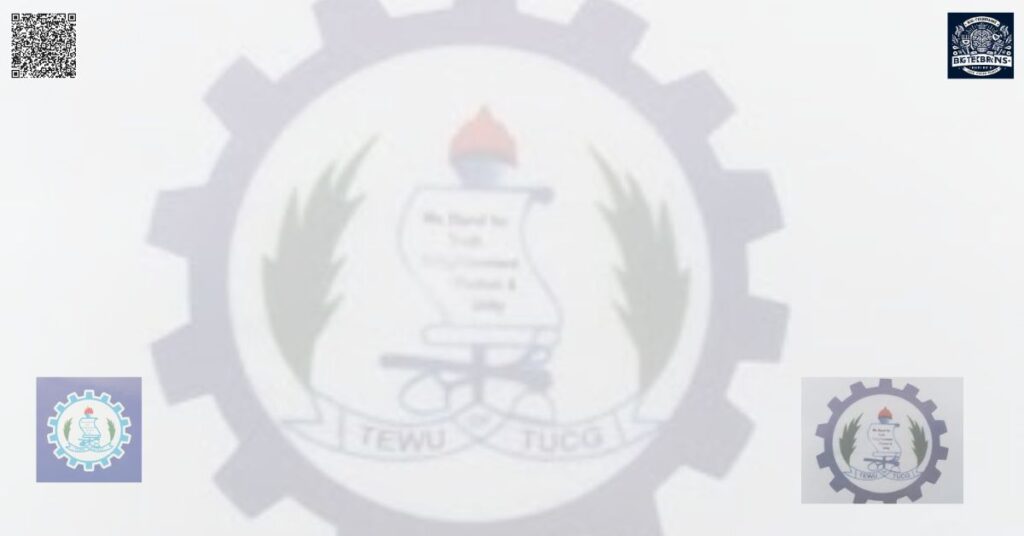Historical Background
The Teachers and Educational Workers Union (TEWU) is one of the key labor unions in Ghana, dedicated to advocating for the welfare of non-teaching staff in the education sector. Established in the mid-20th century, TEWU was formed in response to the need for a structured body to represent the interests of non-teaching personnel, including administrative staff, janitors, accountants, and technical workers in educational institutions. Over the years, TEWU has played a crucial role in improving working conditions, ensuring fair wages, and protecting the rights of its members through collective bargaining and negotiations with the government.
Constitutional Role or Mandate
TEWU operates under the umbrella of the Trades Union Congress (TUC) of Ghana, with a mandate to:
- Advocate for fair remuneration and improved working conditions for its members.
- Engage in negotiations with the government and educational institutions to secure favorable employment terms.
- Provide legal representation and support for members facing workplace disputes.
- Organize training programs to enhance the skills and professional development of non-teaching staff.
- Promote the welfare of members through health insurance, pension schemes, and other benefits.
Organizational Structure
TEWU’s structure is designed to ensure effective governance and representation of its members at various levels. The union operates through:
National Executive Council (NEC):
- The highest decision-making body responsible for major policies and directives.
Regional and District Executives:
- These offices oversee operations within specific geographical locations.
Local Branches:
- Each educational institution has a TEWU branch led by an elected branch executive committee.
General Membership:
- Comprising all registered members who participate in voting and decision-making processes.
Leadership or Ranks
The leadership hierarchy of TEWU consists of:
General Secretary:
- The chief spokesperson and administrator of the union.
National Chairman:
- Oversees the activities of TEWU at the national level.
Deputy General Secretary:
- Assists the General Secretary in executing administrative functions.
Regional and District Secretaries:
- Lead regional and district branches respectively.
Branch Executives:
- Handle the union’s affairs at the institutional level.
Mode of Appointment or Recruitment
Membership in TEWU is open to all non-teaching staff within the educational sector. The recruitment process involves:
Registration:
- Interested individuals fill out a membership application.
Approval:
- The local TEWU branch processes the application and forwards it to the national office.
Subscription Payment:
- Members contribute union dues deducted directly from their salaries.
Participation:
- Members engage in union activities, elections, and advocacy programs.
For leadership positions, appointments are conducted through democratic elections at various levels, ensuring transparency and equal representation.
Offices or Units That Work With or Under TEWU
TEWU collaborates with various governmental and educational bodies, including:
Ghana Education Service (GES):
- For negotiations related to non-teaching staff welfare.
Ministry of Employment and Labour Relations:
- For policy discussions and labor rights advocacy.
Trades Union Congress (TUC):
- As the umbrella body coordinating labor movements in Ghana.
Social Security and National Insurance Trust (SSNIT):
- To ensure members receive pension benefits.
Educational Institutions:
- Universities, technical schools, and colleges where TEWU has an active presence.
Constitutional Reforms
TEWU, like other labor unions, periodically amends its constitution to address emerging labor issues and enhance its operational framework. Some notable reforms include:
- Adjustments in leadership tenure and election procedures to promote inclusivity.
- Introduction of digital membership registration for efficiency.
- Enhanced dispute resolution mechanisms to address conflicts within the union and with employers.
Achievements
TEWU has made significant strides in improving the welfare of its members, including:
- Salary increments and improved conditions of service through successful collective bargaining.
- Enhanced job security for non-teaching staff.
- Provision of professional development programs to upgrade members’ skills.
- Establishment of welfare schemes including pension contributions and health benefits.
- Resolution of labor disputes through effective negotiation with employers.
References
- Trades Union Congress Ghana. (n.d.). Retrieved from https://www.ghanatuc.org
- Ghana Education Service (GES). (n.d.). Retrieved from https://ges.gov.gh
- Ministry of Employment and Labour Relations, Ghana. (n.d.). Retrieved from https://melr.gov.gh

